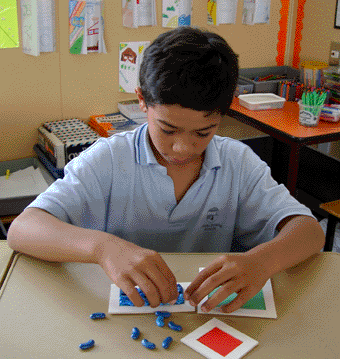|
|
|
|||||
Students’ attitudes, interests and liking for a subject have a strong bearing on their achievement. The Mathematics Survey sought information from students about their curriculum preferences and perceptions of their own achievement. The questions were the same for year 4 and year 8 students. The survey was administered to the students in an independent session (four students working individually on tasks, supported by a teacher). The questions were read to year 4 students, and also to individual year 8 students who requested this help. Writing help was available if requested. The survey included eleven items which asked students to record a rating response by circling their choice, two items which asked them to select three preferences from a list, one item which asked them to nominate up to six activities, and three items which invited them to write comments. The students were first asked to select their three favourite school subjects from a list of twelve subjects. The results are shown below, together with the corresponding 1997 results.
|
|||||||||||||||||||||||||||||||||||||||||||||||||||||||||||||||||||||||||||||||||||||||||||||||||||||||||||||||||||||||||||||||||||||||||||||||||||||||||||||||||||||||||||||||||||||||||||||||||||
|
Year
4 Mathematics Survey
|
%
responses 2001 (1997)
|
||||
| more | about the same | less | |||
|
1.
Would you like to do more, the same or less maths at school?
|
38 (36) | 39 (46) | 23 (18) | ||
|
|
|
|
|
don't
know
|
|
| 2. How much do you like doing maths at school? | 51 (52) | 30 (31) | 10 (10) | 9 (7) | |
| 3. How good do you think you are at maths? | 41 (40) | 45 (46) | 10 (11) | 4 (3) | |
| 4. How good does your teacher think you are at maths? | 46 (37) | 25 (29) | 5 (5) | 1 (1) | 23 (28) |
| 5. How good does your Mum or Dad think you are at maths? | 65 (60) | 15 (19) | 4 (3) | 1 (1) | 15 (16) |
| 6. How much do you like doing maths on your own? | 53 (•) | 23 (•) | 14 (•) | 10 (•) | |
| 7. How much do you like doing maths with others? | 55 (•) | 27 (•) | 9 (•) | 9 (•) | |
| 8. How much do you like helping others with their maths? | 56 (•) | 25 (•) | 9 (•) | 10 (•) | |
| 9. How do you feel about doing things in maths you haven’t tried before? | 47 (39) | 28 (35) | 15 (20) | 10 (6) | |
| 10. How much do you like doing maths in your own time (not at school)? | 37 (41) | 23 (26) | 16 (14) | 24 (19) | |
| yes | maybe / not sure | no | |||
| 11. Do you want to keep learning maths when you grow up? | 51 (54) | 41 (41) | 8 (5) | ||
|
Year
8 Mathematics Survey
|
%
responses 2001 (1997)
|
||||
| more | about the same | less | |||
|
1.
Would you like to do more, the same or less maths at school?
|
13 (14) | 59 (63) | 28 (23) | ||
|
|
|
|
|
don't
know
|
|
| 2. How much do you like doing maths at school? | 26 (25) | 40 (49) | 23 (18) | 11 (8) | |
| 3. How good do you think you are at maths? | 22 (14) | 58 (60) | 16 (22) | 4 (4) | |
| 4. How good does your teacher think you are at maths? | 20 (15) | 34 (36) | 10 (6) | 3 (2) | 33 (41) |
| 5. How good does your Mum or Dad think you are at maths? | 35 (26) | 32 (39) | 7 (9) | 1 (2) | 25 (24) |
| 6. How much do you like doing maths on your own? | 23 (•) | 42 (•) | 21 (•) | 14 (•) | |
| 7. How much do you like doing maths with others? | 49 (•) | 34 (•) | 11 (•) | 6 (•) | |
| 8. How much do you like helping others with their maths? | 30 (•) | 40 (•) | 20 (•) | 10 (•) | |
| 9. How do you feel about doing things in maths you haven’t tried before? | 33 (26) | 38 (46) | 21 (22) | 8 (6) | |
| 10. How much do you like doing maths in your own time (not at school)? | 9 (13) | 22 (28) | 33 (33) | 36 (26) | |
| yes | maybe / not sure | no | |||
| 11. Do you want to keep learning maths when you grow up? | 39 (43) | 54 (53) | 7 (4) | ||
